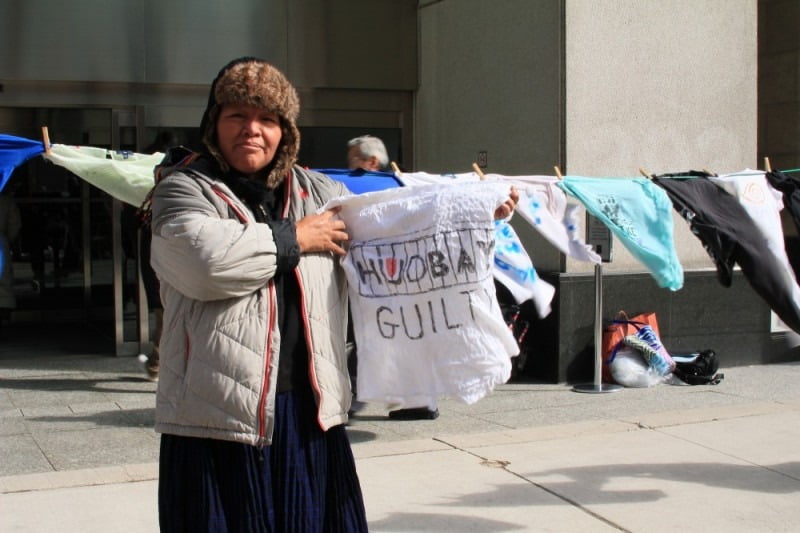
Photograph: Monica Gutierrez.
Canadians vie for it, want it, and when they play hockey, they demand it. Gold. For most Canadians it’s a medal they would like to see hanging around Sidney Crosby’s neck. But that gold, silver, nickel or bronze comes from somewhere, and invariably, when it is produced there is a cost, and not just the money required to purchase the bling.
Canada is host to the largest mining sector in the world. There are more mining companies based in Canada, then anywhere else. But, increasingly, while the stock price of gold and other metals continues to remain high and bring value to its shareholders, those who are caught in the entrails of the communities where mines are operating are paying a heavy price.
Adolfo Ich Chamán was leader in the community of El Estor, a town in eastern Guatemala. It’s a small community located on the shores of Lake Izabel. “Adolfo was a teacher, he worked with the school and the students, everyone knew him. That’s why he was a leader” explains his widow, Angelica Choc. It was because he was a leader, that human rights advocates allege he was killed by the private security firm that was hired to protect the interests of the mine.
In a precedent setting case, Canadian mining company, HudBay Minerals is being sued by a group of Guatemalans, including Choc, along with German Chub who was shot and paralyzed, and eleven women who were allegedly raped by the security forces who worked for HudBay. The attacks against the Guatemalans are tied to a land dispute at the heart of the conflict between a Canadian mining company and an Indigenous community in Guatemala.
While the company claims the communities are “illegal squatters”, the indigenous Mayan Q’eqchi’ assert they have a moral and historical right to reclaim the ancestral land that was taken from them during the Guatemalan civil war. According to Choc, “We didn’t invade the land, we have the right to live in dignity. It was an abandoned area, why have abandoned land when there are so many families that need it.”
Cory Wanless, a lawyer with Klippensteins law firm that has taken on the case on behalf of the Guatemalan plaintiffs, describes how Angelica’s husband was identified as a leader by the private security forces of HudBay and “brutally murdered, hacked with machetes, beaten and shot in the head.”
A public interest group has been monitoring the practices of mining companies, and according to Jen Moore of Mining Watch Canada, this case is important “because it represents an attempt to break through the wall of corporate impunity to obtain justice for people that were egregiously harmed in Guatemala, and to hold a parent company responsible for the actions it takes that have led to terrible violence abroad.”
HudBay had vigorously disputed the allegations in court and argued the case shouldn’t be heard in Canada based on jurisdictional grounds, suggesting it was more appropriately heard in Guatemala. Wanless noted that trying the case in civil or criminal court in Guatemala was not an option. “Guatemala is one of the most violent places on earth, one of the highest murder rates and low level of probability of conviction, 99.75% of which goes unpunished
Choc concurs, “We know very well and recognize that our authorities are corrupt and manipulated by money and impunity. Here in Guatemala, there is no justice. Whoever has money, has justice. We knew we wouldn’t be listened to in Guatemala.”
Just prior to the hearing, HudBay withdrew their objection and conceded that the case could be heard in a Canadian court. “I think it is a Canadian precedent that a Canadian mining company that’s been accused of human rights abuses will be heard in Canada.” Wanless declared.
While the one layer of defence has now been removed, the case now hinges on the role of a subsidiary company’s relationship to their parent business. Mining companies, often form partnerships, create junior corporations, or farm out their operations in other countries, to subsidiaries who work on their behalf. In the past this has buffeted the legal responsibility of parent companies, who have been able to argue that they are not responsible for the actions of the subsidiary. This is precisely the argument that HudBay has used.
Moore believes this is a smokescreen that has allowed mining companies to shirk their responsibilities. She asserts “the company knew there was serious possibility of risk”. Wanless also argues the actions of the private security firm can be tied to the decisions made in the corporate head office in Toronto “this is a management problem which the court will have to determine. What were the management decisions? Were they negligent in those decisions?”
According to Wanless, what has concerned Canadians who have paid attention to the abuses perpetrated by mining companies is “you can be a Canadian mining company hiring private security forces, not sure if they are trained, send them out and evict people from their homes. It is not surprising, and entirely predictable there could be problems and that there would also be total impunity.” Wanless also notes “When you look at mining companies, it is disturbingly common.”
The hearings took place March 4th and 5th, and a decision is not expected until sometime in June. Whether a precedent will be set, and Canadian mining companies will be brought to task will depend on a ruling by the Ontario Supreme Court. But for Angelica Choc ““I have hope in my heart. It is our right to be heard and get justice.”
Meanwhile activists protesting the activities of mining companies will be touring around the country, highlighting the need for greater scrutiny of companies that mine the metals that adorn the necklaces, watches and the rings on our fingers, covers our coins, and that has become the “gold” standard our athletes strive for.